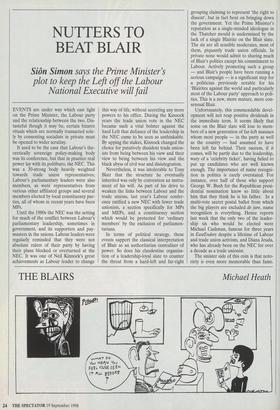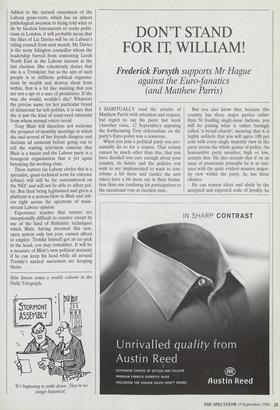NUTTERS TO BEAT BLAIR
Sion Simon says the Prime Minister's plot to keep the Left off the Labour National Executive will fail
EVENTS are under way which cast light on the Prime Minister, the Labour party and the relationship between the two. Dis- tasteful though it may be, certain bizarre rituals which are normally transacted sole- ly by consenting socialists in private must be opened to wider scrutiny.
It used to be the case that Labour's the- oretically sovereign policy-making body was its conference, but that in practice real power lay with its politburo, the NEC. This was a 30-strong body heavily weighted towards trade union representatives; Labour's parliamentary leaders were also members, as were representatives from various other affiliated groups and several members elected by local constituency par- ties, all of whom in recent years have been MPs.
Until the 1980s the NEC was the setting for much of the conflict between Labour's parliamentary leadership, sometimes in government, and its supporters and pay- masters in the unions. Labour leaders were regularly reminded that they were not absolute rulers of their party by having their plans blocked or overturned at the NEC. It was one of Neil Kinnock's great achievements as Labour leader to change this way of life, without accreting any more powers to his office. During the Kinnock years the trade union vote in the NEC became such a vital bolster against the hard Left that defiance of the leadership in the NEC came to be seen as unthinkable. By upping the stakes, Kinnock changed the choice for putatively dissident trade union- ists from being between his view and their view to being between his view and the black abyss of civil war and disintegration.
Nevertheless, it was intolerable to Tony Blair that the structure he eventually inherited was only by convention an instru- ment of his will. As part of his drive to weaken the links between Labour and the trade unions, last year's Labour confer- ence ratified a new NEC with fewer trade unionists, a section specifically for MPs and MEPs, and a constituency section which would be protected for 'ordinary members' by the exclusion of parliamen- tarians.
In terms of political strategy, these events support the classical interpretation of Blair as an authoritarian centraliser of power. So does his clandestine organisa- tion of a leadership-loyal slate to counter the threat from a hard-left and far-right grouping claiming to represent 'the right to dissent', but in fact bent on bringing down the government. Yet the Prime Minister's reputation as a single-minded ideologue in the Thatcher mould is undermined by the lack of a single Blairite on the Blair slate. The six are all sensible moderates, most of them, piquantly trade union officials. In private none would admit to sharing much of Blair's politics except his commitment to Labour. Actively promoting such a group — and Blair's people have been running a serious campaign — is a significant step for a politician previously notable for his `Blairites against the world and particularly most of the Labour party' approach to poli- tics. This is a new, more mature, more con- sensual Blair.
Unfortunately, this commendable devel- opment will not reap positive dividends in the immediate term. It seems likely that some on the Blair slate will lose to mem- bers of a new generation of far-left maniacs whom most people — in the party as well as the country — had assumed to have been left far behind. Their success, if it comes, will be partly due to the leadership, wary of a 'celebrity ticket', having failed to put up candidates who are well known enough. The importance of name recogni- tion in politics is rarely overstated. For instance, over half of those who support George W. Bush for the Republican presi- dential nomination know so little about him that they think he is his father. In a multi-vote secret postal ballot from which the big players are excluded de jure, name recognition is everything. Hence reports last week that the only two of the leader- ship six who would be elected were Michael Cashman, famous for three years in EastEnders despite a lifetime of Labour and trade union activism, and Diana Jeuda, who has already been on the NEC for over a decade as a trade unionist.
The sinister side of this coin is that noto- riety is even more memorable than fame. Added to the natural cussedness of the Labour grass-roots, which has an almost pathological aversion to being told what to do by faceless bureaucrats or cocky politi- cians in London, it will probably mean that the likes of Liz Davies will be on Labour's ruling council from next month. Ms Davies is the noisy Islington councillor whom the leadership barred from contesting Leeds North East in the Labour interest at the last election. She vehemently denies that she is a Trotskyist; but as the aim of such people is to infiltrate political organisa- tions by stealth and destroy them from within, that is a bit like insisting that you are not a spy or a user of prostitutes. If she was, she would, wouldn't she? Whatever the precise name for her particular brand of delusional far-left politics, it is sure that she is just the kind of crazy-eyed extremist from whom normal voters recoil.
Tony Blair will therefore not welcome the prospect of monthly meetings at which she and several of her friends disagree and declaim ad nauseam before going out to tell the waiting television cameras that Blair is a fascist and the Labour party is a bourgeois organisation that is yet again betraying the working class.
These nutters (in Labour circles this is a specialist, quasi-technical term for extreme leftists) will still be far outnumbered on the NEC and will not be able to affect pol- icy. But their being legitimised and given a platform is a serious blow to Blair and oth- ers right across the spectrum of main- stream Labour opinion.
Experience teaches that nutters are exceptionally difficult to counter except by use of the kind of Stalinistic techniques which Blair, having invented this new, open system only last year, cannot afford to employ. Trotsky himself got an ice-pick in the head, you may remember. It will be a measure of Blair's new political maturity if he can keep his head while all around Trotsky's natural successors are keeping theirs.
Sion Simon writes a weekly column in the Daily Telegraph.
It's beginning to settle down. They're longer historical.'











































































 Previous page
Previous page